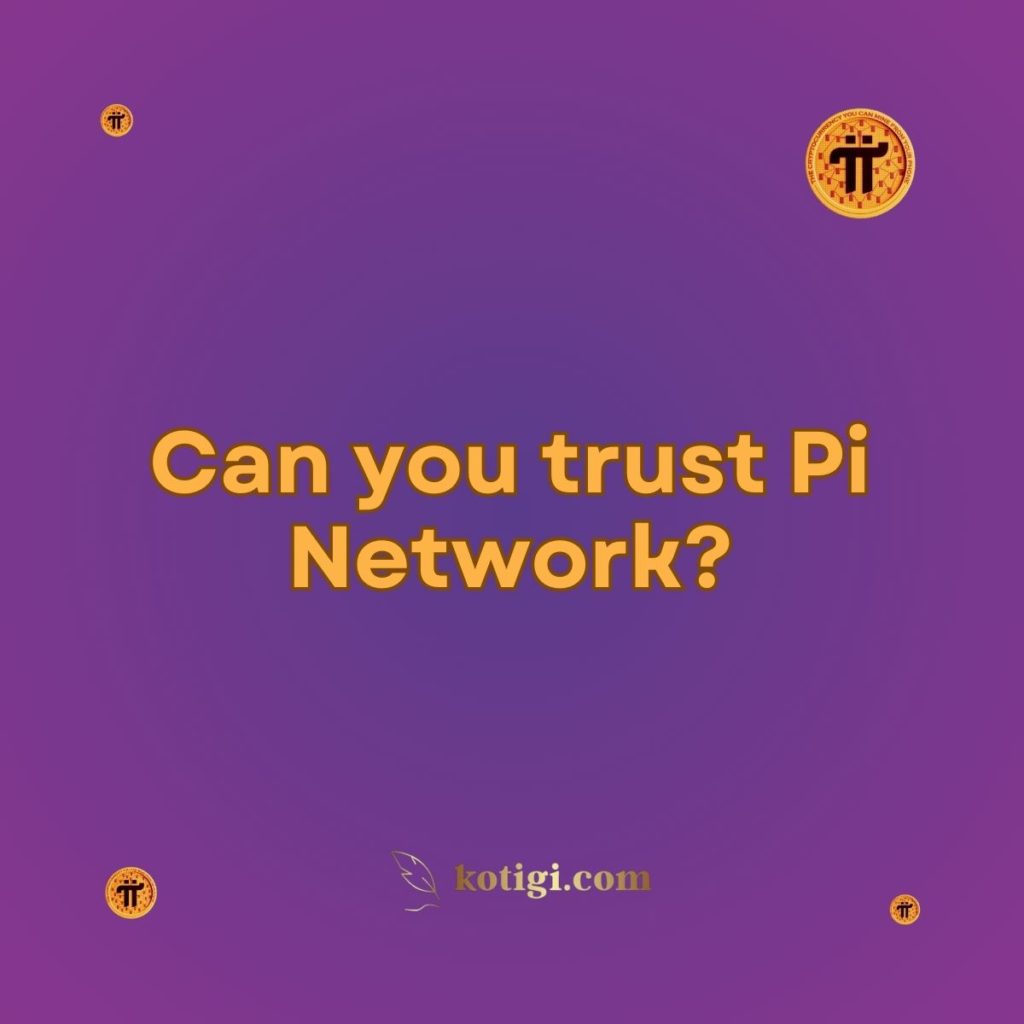
In the ever-evolving world of cryptocurrency, the Pi Network has emerged as one of the most talked-about projects, gaining millions of users with its mobile-first, eco-friendly approach to mining. As Pi Network continues to attract attention, a critical question on the minds of many is: “Can you trust Pi Network?”
In this article, we will dive into Pi Network’s origins, its technological framework, its development team, and the key factors that influence whether Pi Network is trustworthy. By the end of this post, you should have a clearer understanding of whether or not you can place your confidence in this emerging cryptocurrency.
What Is Pi Network?
Pi Network was founded in 2019 by a group of Stanford graduates with the vision of making cryptocurrency accessible to everyone. Unlike traditional cryptocurrencies like Bitcoin and Ethereum, which require powerful hardware and high energy consumption for mining, Pi Network allows users to mine Pi coins using just their smartphones.
1. Mobile-First Mining Approach
Pi Network’s main innovation lies in its mobile-first mining model. By downloading the Pi app, users can mine Pi coins with the press of a button, making the process accessible to anyone with a smartphone. The app is designed to be user-friendly, and mining Pi does not drain battery life or use much processing power, as it relies on the Stellar Consensus Protocol (SCP), which is far less resource-intensive than traditional mining methods.
2. Mission to Democratize Cryptocurrency
Pi Network aims to decentralize and democratize access to cryptocurrency. Its developers argue that Bitcoin’s Proof-of-Work (PoW) mining has centralized wealth and power into the hands of a few large miners, leaving ordinary users behind. Pi Network seeks to address this by offering free, mobile mining to a global audience, allowing everyday people to participate in the network.
3. Pi’s Status as a ‘Pre-Mainnet’ Project
It is important to note that Pi Network is currently in its Testnet phase. While users can mine Pi coins, the coins do not yet hold real-world value. Once the network launches its Mainnet (expected in the near future), Pi is expected to gain value and be tradable on cryptocurrency exchanges.
Who Is Behind Pi Network?
One of the most critical factors in assessing whether Pi Network can be trusted is understanding the team behind it.
1. Founding Team
Pi Network was founded by three Stanford graduates: Dr. Nicolas Kokkalis, Dr. Chengdiao Fan, and Vincent McPhillip. Their backgrounds in computer science and blockchain technology lend credibility to the project. Dr. Kokkalis, in particular, is an expert in distributed systems and blockchain, which are crucial for developing a decentralized cryptocurrency.
2. Transparency and Open Development
While the founding team’s credentials are solid, some users have raised concerns about transparency. Pi Network’s roadmap has been relatively opaque at times, with delays in transitioning from Testnet to Mainnet. Additionally, Pi’s whitepaper lacks some of the detailed technical explanations that are common in other blockchain projects. However, the team has been active in engaging with the community, providing updates through social media channels and the Pi app.
Is Pi Network a Scam?
Given the number of fraudulent projects in the cryptocurrency space, it’s natural to be cautious when evaluating new platforms like Pi Network. The question remains: Is Pi Network a scam?
1. No Monetary Investment Required
One of the strongest arguments in favor of Pi Network’s legitimacy is that users are not required to invest any money. Unlike many scam projects that ask for upfront payments or promise guaranteed returns, Pi Network allows users to mine Pi coins for free. All you need is a smartphone and an internet connection. This removes a significant red flag that is often associated with crypto scams.
2. App Security and Permissions
Some users have expressed concerns over the permissions required by the Pi app, which includes access to personal information like phone numbers and contact lists. While these permissions are standard for social applications, users should always be cautious about the data they share. To date, there has been no concrete evidence of misuse of user data by the Pi team, but it is always important to weigh privacy concerns when downloading any app.
3. No Immediate Value
Critics often point out that Pi coins currently have no value, as the network has not yet transitioned to Mainnet. This has led some to label the project as speculative or even a scam. However, it’s common for cryptocurrency projects to take years before their tokens gain real-world value. Pi’s future depends on whether it can successfully launch its Mainnet and establish use cases for the coin.
Factors That Impact Pi Network’s Trustworthiness
There are several important factors to consider when assessing whether Pi Network can be trusted.
1. Centralization vs. Decentralization
One concern about Pi Network is that it is currently more centralized than decentralized. The core team has control over the project’s development and the distribution of Pi coins. For Pi Network to gain the trust of the broader cryptocurrency community, it will need to prove that it can transition to a fully decentralized model, where users, not developers, govern the network.
2. Community Trust and Engagement
Pi Network boasts a large and active community, with over 45 million users worldwide. This strong community support is a positive indicator of the project’s potential. The developers have also emphasized the importance of community input in shaping the future of Pi. That said, community support alone is not enough—Pi Network must deliver on its promises to maintain trust.
3. Mainnet Launch and Real-World Utility
Ultimately, the trustworthiness of Pi Network will depend on the successful launch of its Mainnet and the creation of real-world utility for Pi coins. While the Testnet phase has allowed users to mine Pi coins, the true test will come when these coins can be used for transactions or traded on cryptocurrency exchanges. If Pi can deliver on its promise of creating a decentralized marketplace and ecosystem, it will solidify its place as a trustworthy cryptocurrency.
Risks of Trusting Pi Network
While Pi Network shows potential, there are inherent risks in trusting any new cryptocurrency project.
1. Speculative Nature
As Pi coins have no real-world value yet, mining them is a speculative venture. There is no guarantee that Pi will ever reach the value or adoption level of Bitcoin or Ethereum. Users who mine Pi should do so with the understanding that it is a long-term project, and there are no guaranteed returns.
2. Delayed Roadmap
Pi Network has faced delays in its roadmap, particularly in the transition from Testnet to Mainnet. While delays are common in the world of blockchain development, they can erode trust among users who are eager to see progress. It’s crucial for the Pi team to provide clear communication and transparency moving forward.
Conclusion
Can you trust Pi Network? While there are some legitimate concerns, Pi Network does not exhibit the typical characteristics of a scam. Its free mining model, lack of monetary investment, and the reputable backgrounds of its founders lend credibility to the project. However, trust in Pi Network ultimately depends on its ability to transition to Mainnet, create real-world utility for Pi coins, and prove that it can operate in a decentralized manner.
As with any cryptocurrency project, it is important to approach Pi Network with a healthy level of caution. Users should keep in mind that Pi is still in its early stages, and its future success is not guaranteed. If Pi Network can deliver on its promises, it may become a trustworthy player in the cryptocurrency space, but until then, it remains a speculative venture.
Can you trust Pi Network?
Pi Network is not a scam, but it remains a speculative project. While its mobile mining model and free participation add legitimacy, the network has not yet launched its Mainnet, and the future value of Pi coins is uncertain. Trust in Pi Network will depend on its ability to deliver real-world utility and a decentralized system.
Key Takeaways
- Mainnet Launch Will Be Key: Pi’s trustworthiness will largely depend on the successful transition to Mainnet and the creation of real-world utility for Pi coins.
- Mobile-First Mining: Pi Network offers an accessible mobile mining solution, unlike energy-intensive cryptocurrencies like Bitcoin.
- No Monetary Investment Required: Pi Network does not require users to invest money, making it less risky compared to traditional crypto scams.
- Founder Credibility: The team behind Pi Network consists of Stanford graduates with expertise in blockchain and distributed systems, lending legitimacy to the project.
- Speculative Venture: Pi Network is still in its Testnet phase, and Pi coins have no real-world value yet, making the project speculative.





